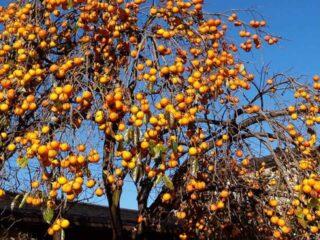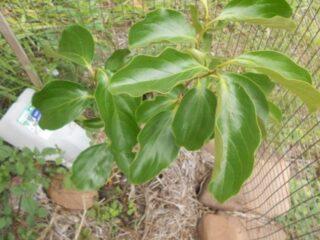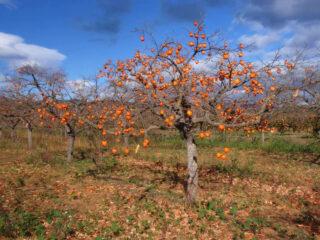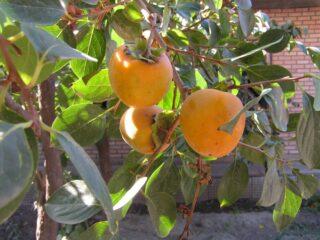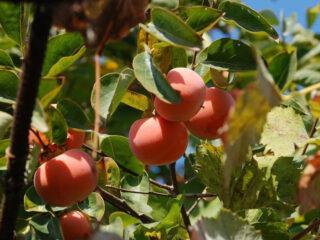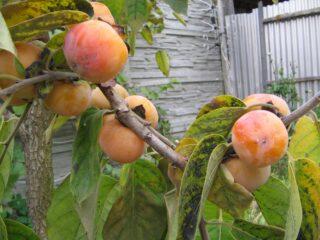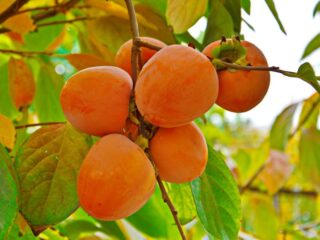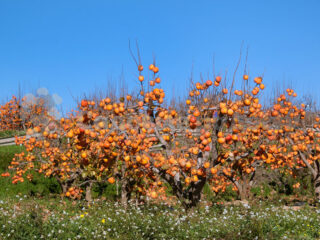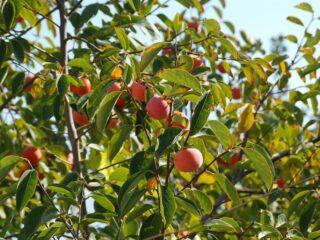Content
Honey persimmon is a real autumn hit, delighting not only with its orange-sunny color, but also with an amazing taste, reminiscent of flower honey. In addition, the fruits contain a whole storehouse of useful vitamins that the body needs in anticipation of the winter cold.
Description of persimmon variety Honey
Honey Persimmon is a low tree with a slightly curved trunk and a wide “ragged” crown. The bark of the tree is dark gray, the branches are branched, the leaves are simple, oval, with pointed ends. The upper part of the leaf blades is dark green, the lower part is lighter. The leaves are leathery, with well-defined veins.
The variety blooms in late May or early June, depending on climatic conditions. The inflorescences of the culture are small, almost inconspicuous. They are white or yellowish calyxes collected from four petals.
The fruits (from a botanical point of view, these are berries) are juicy, fleshy, slightly elongated ovoid in shape. The skin is thin and smooth. The flesh is bright orange.When ripe, the berries have a characteristic jelly-like structure. Due to the thin skin and too soft consistency, problems arise with transportation, so the fruits are harvested slightly unripe.
This variety has no seeds. It is distinguished by a sweet taste with pronounced honey notes. Some people consider the Medovaya variety to be too sugary. The harvest of juicy ripe berries begins to be harvested in October. The collection can continue until mid-November (depending on the region of growth).
Under favorable circumstances, the tree bears fruit for 50-60 years. The first harvest is obtained already in the second year of the tree’s life. The crop enters full fruiting in the tenth year.

The second name of Honey persimmon is Tangerine
This variety is classified as sun-loving. At the same time, it has average resistance to frost. Persimmon does not require a lot of rainfall, preferring nutritious soil, so the tree rarely takes root on sandy soil.
Does Honey persimmon knit?
Tannins are responsible for viscosity. These tannins, coming into contact with the mucous membrane, provoke protein coagulation. As a result, a specific astringent taste appears.
Tannins are present in every variety and are capable of:
- constrict blood vessels;
- reduce the secretion of the salivary glands;
- inhibit gastrointestinal peristalsis.
In this way, only unripe fruits affect the body. Ripe specimens of the Honey variety do not knit.
Composition and calorie content
Persimmon is one of the healthiest berries. Honey has high nutritional value. 100 g of sweet pulp contains 53 kcal.
The chemical composition of the fruit contains:
- B vitamins;
- retinol;
- riboflavin;
- ascorbic and folic acid;
- tannins;
- iron;
- zinc;
- magnesium;
- calcium;
- phosphorus;
- iodine;
- potassium.
The bright orange fruits contain a lot of pectin.This polysaccharide is very beneficial for the digestive system.
Almost 80% of the composition is water. As for BJU, 19% are carbohydrates, 0.6% are proteins and 0.4% are fats.
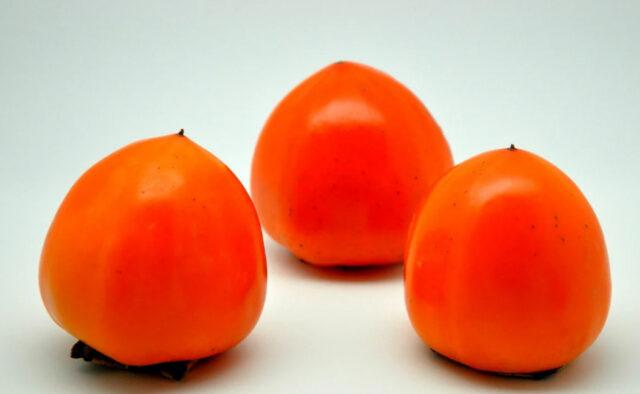
Marmalade is often prepared from Medovaya persimmons.
No less useful are the roots of the tree, which contain naphthoquinones, which have a lot of medicinal properties.
The benefits and harms of Honey persimmon
The benefits of this variety can be judged by its rich composition.
Pectin improves the functioning of the gastrointestinal tract, regulates peristalsis and prevents constipation. Fiber gently cleanses the intestines. Ascorbic acid improves immunity, and B vitamins and retinol strengthen vision and stimulate brain function.
Thanks to the presence of naphthoquinones, persimmon prevents the development of cancer. Beta-carotene prevents the oxidation of free radicals, which has a positive effect on the dynamics of cancer.
The fruits are also useful for disorders of the cardiovascular and musculoskeletal systems, as they are known for their high content of magnesium and calcium. The berries of this tree are recommended for kidney diseases. This is a natural diuretic.
Eating sweet fruits promotes increased production of endorphins, which improves the emotional state. This is a pleasant and tasty way to combat stress and seasonal depression.
The iron contained in fruits is involved in hematopoietic processes, so they are indispensable for anemia. Doctors recommend actively consuming Honey persimmon in the off-season for vitamin deficiency. The variety is also useful for pregnant women, as it contains iodine and folic acid necessary for expectant mothers.
Nutrition experts advise eating not only ripe, but also slightly unripe specimens. They are capable of:
- improve blood clotting;
- raise general tone;
- quickly remove toxins;
- inhibit inflammatory processes.
The juice is often used during colds as an expectorant and antimicrobial agent.
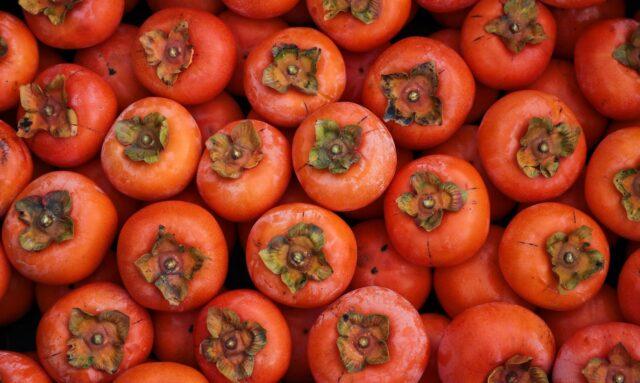
Honey persimmon is a powerful weapon against vitamin deficiency
You can make not only preserves, jams and marmalades from persimmons. It is dried and made into a healthy vitamin juice, which is used, for example, in the treatment of scurvy. Healthy tea rich in ascorbic acid is brewed from small unripe specimens. Dry fruits are ground into powder, which is used to cleanse the skin of age spots.
Contraindications to the use of Honey persimmon
However, the use of this variety has a number of restrictions. Honey persimmon is prohibited for the following diseases:
- diabetes;
- stomach ulcer;
- allergy.
It should not be used by people who have undergone stomach surgery.
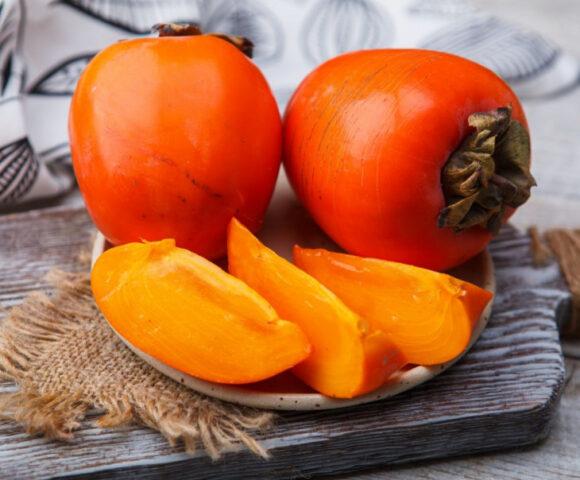
You need to try persimmons in small portions to determine if you are allergic to the fruit.
This fruit can cause intestinal obstruction. Persimmons should not be introduced into the diet of children under one year old; they can cause allergic reactions, diarrhea and dehydration.
Conclusion
Honey persimmon, or tangerine, is a unique fruit in composition. This is not just a tasty treat, but also an additional aid in the treatment of many diseases. However, its use is associated with a number of contraindications that need to be remembered before introducing the fruit into your daily diet.
Reviews of honey persimmon
